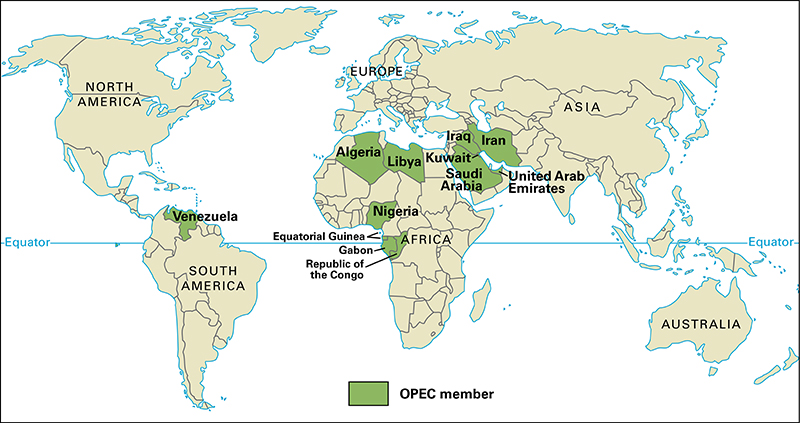Organization of the Petroleum Exporting Countries (OPEC) is an association of 12 countries that depend heavily on oil exports for their incomes. Its members work together to increase their revenue from the sale of oil on the world market. OPEC members produce about 40 percent of the world’s oil and possess about 80 percent of the world’s recoverable oil reserves. The members of OPEC are Algeria, Equatorial Guinea, Gabon, Iran, Iraq, Kuwait, Libya, Nigeria, the Republic of the Congo, Saudi Arabia, the United Arab Emirates, and Venezuela. Former members of OPEC include Angola, Ecuador, Indonesia, and Qatar.

OPEC was founded in 1960 by Iran, Iraq, Kuwait, Saudi Arabia, and Venezuela. At that time, the petroleum industry in those countries was controlled by United States and European oil companies. These firms paid the host governments income taxes and royalties (shares of their profits) based on the posted price the companies charged for crude oil on the world market. In 1959 and 1960, oil production greatly exceeded world demand. The surplus that resulted prompted several major companies to cut the posted price and thus their payments to host governments. OPEC was founded in response to this price cut.
OPEC had little influence on oil prices during the 1960’s, when production expanded to keep pace with demand. In the 1970’s, however, world demand for oil began to outgrow what was available from non-OPEC sources. In 1973, OPEC stopped consulting with oil companies and decided to raise oil prices in keeping with the rate of inflation (the rise of all prices).
Armed conflict also contributed to rising oil prices. During the Arab-Israeli War of 1973, some Arab members of OPEC stopped or reduced oil exports to countries supporting Israel. As a result, oil prices in those countries, including the United States and other Western industrial nations, rose sharply. During the late 1970’s, the Iranian revolution caused a shortage that helped OPEC increase oil prices again.
OPEC was less successful at achieving its goals in the 1980’s, when the world oil supply again exceeded demand. In 1983, OPEC cut the price of its oil for the first time. Since the mid-1980’s, OPEC has sought to control production by its members. However, some members have ignored the limits, causing prices to fall during certain periods. By the early 2000’s, the price of oil was less easily influenced by OPEC policy. A rapid rise in oil prices that began in 2003 was largely caused by political conflict in oil-producing nations, rising global demand for oil, and speculation by investors and traders on the commodities markets.
In the 2010’s, OPEC began working more closely with oil-producing countries that were not OPEC members, most notably Russia. This alliance become informally known as “OPEC+” or “OPEC Plus.”
See also Petroleum (History of petroleum use).
